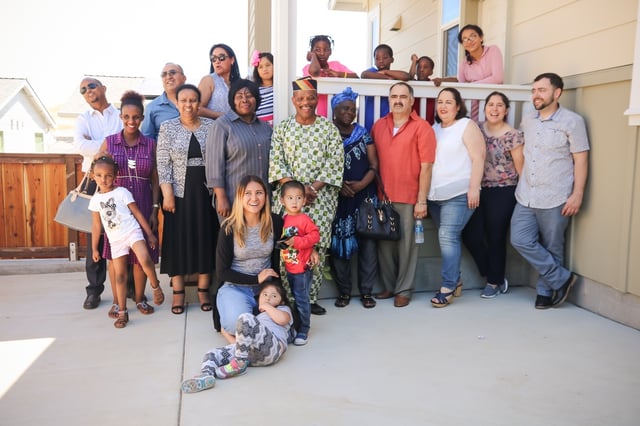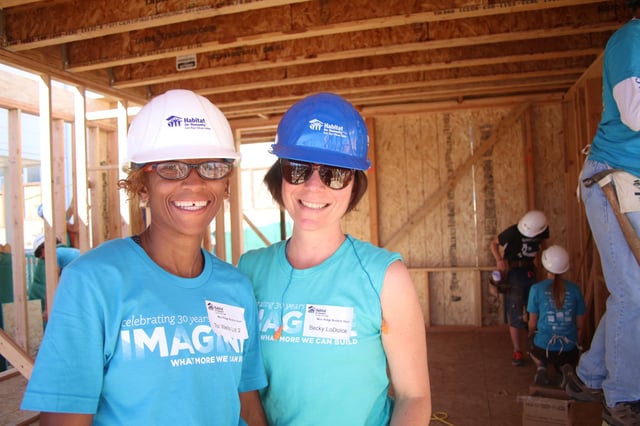Building the Beloved Community
January 15, 2018 Habitat News

Habitat for Humanity is propelled by a vision of a world where everyone has a decent place to live. We devote ourselves to creating that world because we believe everyone — every single one of us, regardless of who we are or where we come from — deserves a decent life and deserves the opportunity for a better future.
Believing is not enough. And so we build.

We build houses — and through those houses, the strength, stability and self-reliance that families need in order to achieve a better life. That better life is our primary goal. And so when we build houses, we also build bridges between people of diverse backgrounds, we build paths to more connected communities, we build ways for all people to come together and share in the creation of a new world.
That new world allows access, equality and opportunity for all. That new world represents what Dr. Martin Luther King Jr. called “the Beloved Community.”
The Beloved Community is fair. The Beloved Community is just. And the Beloved Community is built on love. Not just any love, but as Dr. King said “the love of God operating in the human heart.” That’s a practical love that requires participation. When that love is truly and fully present, it compels us to act.
It’s part of Habitat’s birthright. We began at Koinonia Farm, an interracial community farm outside Americus, Georgia, founded in 1942 by farmer and biblical scholar Clarence Jordan. Throughout the 1950s and 1960s, Clarence and his fellow Koinonia residents were fiercely committed to the equality of all people and utterly devoted to creating opportunity for all.
Born from that vision, we have grown into a global organization that has worked hard to live out that kind of love for more than 40 years. It fuels our belief that making homeownership accessible and affordable for low-income families is a critical component to creating the kind of future that Dr. King envisioned.
We have to care about the needs of those among us who need our help. We have to take on the struggles of others as our own and want for them the exact things that we want for ourselves. We have to live each day in the knowledge that we are bound together, that each of us must do our part, that we thrive together or we will wither alone.
God grant that this tragic midnight of man’s inhumanity to man will soon pass and the bright daybreak of freedom and brotherhood will come into being.”
During a brief correspondence in the 1950s, Dr. King wrote to Clarence, noting the struggles that Koinonia faced from hostile and unwelcoming neighbors. “I hope that you will gain some consolation from the fact that in your struggle for freedom and a true Christian community you have cosmic companionship. God grant that this tragic midnight of man’s inhumanity to man will soon pass and the bright daybreak of freedom and brotherhood will come into being.”

We still await that daybreak. While much has been done, so much more work remains. This will never be a world of equality, of fairness, of human decency that leaves no room for poverty or prejudice or violence, unless we build it. Bold actions speak louder than words. Working together, side by side, is what will continue to move us from tragic midnight to glorious morning. For as Dr. King so powerfully stated: “Darkness cannot drive out darkness; only light can do that. Hate cannot drive out hate; only love can do that.”
With his emphasis on the Beloved Community, Dr. King gave us the blueprint. Folks of faith and perseverance like Clarence have stewarded it and advanced it. Now it’s up to all of us to make it a reality.
In 2018, as we mark the 50th anniversaries of Dr. King’s tragic death and the passage of the Fair Housing Act just days later, Habitat renews our pledge to work harder than ever to help make the Beloved Community a reality.
By Jonathan Reckford, Habitat for Humanity International CEO and Janice Jensen, Habitat for Humanity East Bay/Silicon Valley President and CEO
Join the Conversation
Leave Us a Comment!
We love hearing from our community. Let us know what you think by leaving us a comment below.